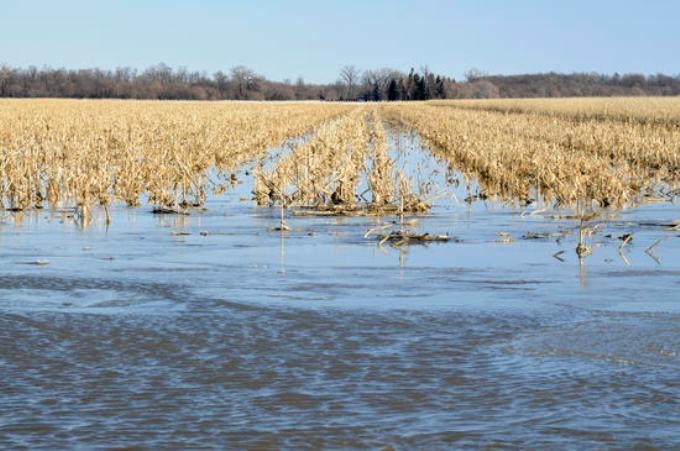Sep 14 2018
When people think about the impacts of climate change, the soil isn’t the first thing that pops into their mind. However, a research by a UC Riverside-led team of scientists predicts a climate-induced decrease in large soil pores, which may intensify the water cycle and add to more soil erosion and flash flooding by the end of the 21st century.
 Flooded farmland might become more common due to climate-induced reduction in large soil pores. (Credit - USDA)
Flooded farmland might become more common due to climate-induced reduction in large soil pores. (Credit - USDA)
In a paper published in the September 5th issue of Nature, the researchers examined the impact of climate change on macroporosity — the number of large pores in the soil. Macropores, which are greater than 0.08 mm in diameter, permit water to be absorbed effortlessly into the surrounding soil, where it can be used by plants, transport nutrients, and ultimately, flow back into underground aquifers.
It is important to predict the response of macroporosity to climate change because of its role in the water cycle, and ultimately in water scarcity, food security, human health and loss of biodiversity.
Daniel Hirmas, Associate Professor, The Department of Environmental Sciences
Using a large database of soils collected over five decades from across the continental U.S. along with atmospheric data from a network of weather stations, the scientists studied variations in macroporosity across a rainfall, humidity, and temperature gradient. They learned macropores were more likely to form in drier climates than humid climates, and that climate-related variations in macroporosity happen over shorter timescales than formerly thought.
The scientists then used climate forecasts for the end of the 21st century to predict that growing humidity by 2080-2100 will decrease soil macroporosity in several regions across the U.S. (with the exception of the southern coastal plain, which covers Louisiana and Alabama).
The consequences could be more surface runoff and erosion, less infiltration of water into the ground, and more flash flooding.
This is the first study to show that the development of macropores is influenced by climate at short timescales and it reinforces the hypothesis that climate change will probably intensify the water cycle. Our results suggest that macroporosity should be incorporated into global climate models to better understand the water cycle, anticipate changes, and prepare for the future.
Daniel Hirmas
The paper is titled “Climate-induced changes in continental-scale soil macroporosity may intensify water cycle.” Besides Hirmas, authors include Daniel Giménez from Rutgers University; Attila Nemes from the Norwegian Institute of Bioeconomy Research (NIBIO); Ruth Kerry from Brigham Young University; and Nathaniel A. Brunsell and Cassandra J. Wilson from the University of Kansas. The research was sponsored by the United States Department of Agriculture’s Agriculture and Food Research Initiative (USDA-AFRI) and NIBIO.